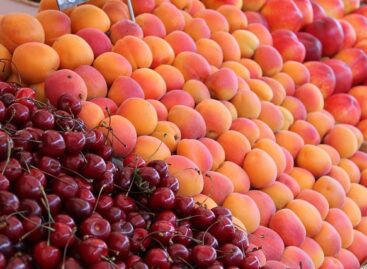Domestic vegetable and fruit production is in danger
It’s a good time to know that Hungary can be a huge loser from climate change, and the severe droughts of recent years often show this. The first victims have already arrived: raspberries, which were once produced in large quantities, were almost completely forced out of domestic production due to the dry and hot summers, but the brutal heat is not good for apricots and apples either. In the same way, one could list quite a few vegetables that are not favored by this new climate. Experts agree that the solution may be to change breeds or even species in several areas. Although there is no need to prepare for shortages thanks to global markets, it is still questionable at what price Hungarians’ favorite fruits and vegetables will be available here. The outlook is not very promising.
Droughts and heat: The severe effects of climate change
In recent years, long and hot summers have become more and more frequent and intense in Hungary, which pose serious challenges for agriculture. Due to periods of drought, soil moisture drops drastically, which significantly reduces crop yields. As a result, fruit trees and vegetable plants are unable to develop properly, as their roots do not get enough water. This not only negatively affects the quantity of the crop, but also its quality, so farmers are often forced to harvest smaller and less marketable crops.
The need to change the breed structure
According to Dr. Dávid Hollósi, the managing director of MBH Bank’s Agricultural and Food Business, we are not in an easy situation: we clearly need a change in the variety structure, a change in the perception of agricultural technology.
“And what we can close – such as greenhouse cultivation and a certain part of animal husbandry – we must close, we must separate it from the weather,”
Hollósi stressed, speaking to Pénzcentrum. However, the separation of crop production from the weather sounds like a drastic step, and it is not an easy, but even more so not a cheap procedure to implement.
The challenges of growing vegetables and fruits
According to István Varga, FruitVeB’s vice-president dealing with arable vegetable cultivation, adverse weather effects can be mitigated by changing soil cultivation methods – for example, less plowing and less disturbance of the soil -, technological changes, irrigation and a well-thought-out cultivation plan. It is already almost impossible to grow cauliflower and broccoli in Hungary in July and August. In the case of vegetables with a ripening time of 70-80 days, the producers consciously plan and do not time the cultivation for the hottest period. However, for vegetables with a ripening period of 120-150 days, such as red onions and peppers, this is more difficult to solve.
Related news
József Viski: Adaptation and competitiveness are key for the horticultural sector
🎧 Hallgasd a cikket: Lejátszás Szünet Folytatás Leállítás Nyelv: Auto…
Read more >Frost damage devastated last year’s fruit crop
🎧 Hallgasd a cikket: Lejátszás Szünet Folytatás Leállítás Nyelv: Auto…
Read more >Related news
(HU) Átadták a SIRHA Budapest 2026 Innovációs Termékverseny díjait
🎧 Hallgasd a cikket: Lejátszás Szünet Folytatás Leállítás Nyelv: Auto…
Read more >How does the forint exchange rate affect consumer prices?
🎧 Hallgasd a cikket: Lejátszás Szünet Folytatás Leállítás Nyelv: Auto…
Read more >HELL CITY has arrived, led by Michele Morrone
🎧 Hallgasd a cikket: Lejátszás Szünet Folytatás Leállítás Nyelv: Auto…
Read more >









